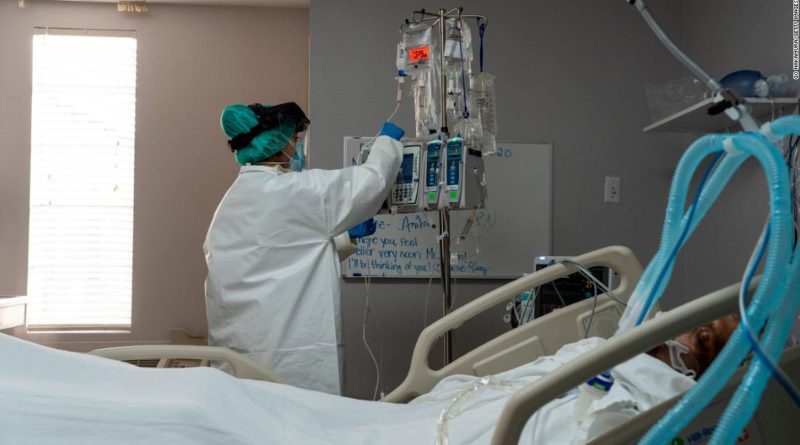‘It’s been an exponential increase.’ Hospitals prepare for another surge as Covid-19 cases climb
“In the last three weeks, I have seen more admissions and sicker patients than on the previous ten weeks,” says Dr. Joseph Varon, the chief medical officer at United Memorial Medical Center. “It’s been an exponential increase on the severity of illness and on the number of cases that we admit.”
In other hospitals across America, similar scenes.
The trend is worrying: a sharp increase in patients can once again overwhelm hospitals, putting critical resources including staffing, beds and ventilators in short supply.
Some hospitals are already so swamped they’ve transferred patients elsewhere, while others are taking steps to prepare for a coming surge.
The relaxed measures fueled the rapid spread of the virus and an influx of new patients needing hospitalization, some doctors say.
“I live close to a beach, and you can see it’s like a party every single day,” says Dr. David De La Zerda, the ICU medical director and a pulmonologist at Jackson Memorial Hospital in Miami.
Houston hospitals transferred patients out
In Harris County, which encompasses Houston and is the most populous county in Texas, at least two hospitals are “pretty much at maximum capacity,” Houston Mayor Sylvester Turner said Wednesday.
“The threat … Covid-19 poses to our community right now is higher than it has been. There is a severe and uncontrolled spread between our families, friends, and communities,” Turner said. “And we need to slow it down, so that it doesn’t overwhelm our healthcare delivery system.”
Several hospitals across Houston are still within capacity limits, he said, except two facilities within the Harris Health System that had to spread “that load around,” Turner said.
“We are actively trying to transfer out ICU and surge patients that are COVID positive and under investigation, just because we don’t have the capacity to treat those patients,” McMurray-Horton said.
“The numbers today, this week, over the last several weeks are far worse than the numbers in March, and April, and May. So if we stay on the current trajectory, we are going to run into problems with capacity,” Turner said.
Hospitals filling up in other parts of US
Some local officials and public health administrators are already reporting strained hospital capacity with the latest influx of patients.
Across the country, one southern California county reported a 99% intensive care unit capacity over the weekend, after taking in overflowing patients from neighboring Imperial County.
“Since mid-June, there has been a growing health crisis with rising coronavirus cases, hospitalizations and ICU bed usage throughout our nation, the state of California and here in Riverside County,” Supervisor Victor Manuel Perez said.
The county announced Monday 96% of all ICU beds were in use — down 3 percentage points from the weekend.
In Florida, the Jackson Health System reported a 108% increase in patients in a little more than two weeks in June, data shows.
“If we continue at the rate we are today, there will be a very high climb, and I don’t know about not having enough beds, but it is already tight.”
Young and sick
More young people have been testing positive for the virus in recent weeks than in the early days of the outbreak, local and state leaders have said, warning that they can spread the virus even though they may not become severely ill.
In Florida, De La Zerda says the incoming patients in his Miami hospital are younger and sicker than the first time the state saw a rise in cases.
“That’s really our major concern,” he told CNN, adding the hospitalized patients they’re receiving on average are between 25 to 45 years of age. In previous months, that average was above 65, he said.
De La Zerda, who told CNN patients in the ICU doubled since last week, said businesses like restaurants shouldn’t be seating customers — and masks should be mandated.
“I have no idea why there’s so much politics involved in the masks,” he said. “We know the masks help you and help others, so yes, should be mandatory.”
Health officials in Los Angeles County said this week some of the county’s outbreaks can be traced back to parties and gatherings.
While many of the hospitalized patients continue to be older, the county’s health services director, Dr. Christina Ghaly, said they’re beginning to see “a slight shift toward a younger demographic.”
How hospitals are preparing
Ghaly said this week as cases in the county climb, there soon may not be enough beds for the patients who will need hospitalization.
“The number of hospital beds could become inadequate in the next few weeks,” Ghaly said. There are only enough ventilators in the county to last four weeks, and Ghaly says the county’s projections show a marked increase in mortality rates.
The hospital system could increase capacity by once again canceling all elective surgeries and adding beds in non-traditional areas like emergency rooms.
The Jackson Health System in Miami opted to pause all elective and non-emergency surgeries as a result of a steady increase of patients being admitted in recent weeks.
“Our clinical leadership has been working diligently throughout this pandemic to ensure that safety of our patients and employees is paramount,” the hospital said.
And in Texas, a similar, move: the governor issued a proclamation suspending elective surgeries in at least four counties to ensure there are enough hospital beds for coronavirus patients.
In Arizona, the governor said at least 2,600 beds were available in the case of a surge, noting the state has begun recording an increase in the use of ventilators.
“I want you to know we’re working very closely with our hospitals and our hospital leaders,” Gov. Doug Ducey said. “We’ve worked to ensure that we can build capacity within this hospital system.”
“What’s the likelihood that you will survive this acute illness and still be alive six months or a year from now,” Dr. Wynia explained.
“We want to say to all the incredible healthcare workers here in Arizona help is on the way,” he said.
CNN’s Miguel Marquez, Jessica Jordan, Cheri Mossburg, Alexandra Meeks, Rosa Flores and Sara Weisfeldt contributed to this report.






